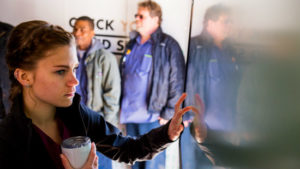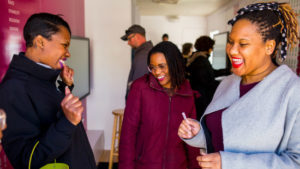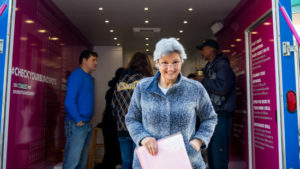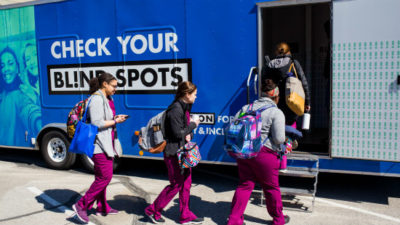Diversity Bus Tour Stops in Kansas City
Fact: The unconscious processing abilities of the human brain are approximately 11 million bits of information per second. Our conscious minds, however, only process 40 bits of information per second. So what exactly goes on in our unconscious minds that we aren’t aware of?
The University of Missouri-Kansas City Division of Diversity and Inclusion, in partnership with CEO Action for Diversity and Inclusion, hosted the “Check Your Blind Spot” campus tour on Tuesday, March 13 on both the Volker and Health Sciences campuses. Members of the university community were invited to learn about one of those millions of unconscious bits of information the conscious mind tends to leave out—bias.

What are blind spots?
According to CEO Action, blind spots are our brains on autopilot. “Experts tell us that our unconscious mind makes the majority of our decisions. It creates blind spots — unconscious biases that can narrow our vision and potentially influence our behaviors.”
Visitors participated in an educational video experience, took short implicit association tests and were provided with educational content, which included lists of potential blind spots and actions to help address them.
It was an eye-opening experience for many as test results made new revelations for some regarding their own preexisting biases. The event also sparked motivation for students, faculty and staff to start the conversation on how to take steps toward promoting diversity and inclusion in their communities and future workplaces.
Interim Chancellor and Provost Barbara Bichelmeyer kicked off the event with welcome remarks and signed the CEO Action diversity pledge.
“This pledge signifies a commitment driven by a realization that diversity and inclusion is not a competitive issue,” said Bichelmeyer. “It is a societal issue that we must address.”

The pledge commits to three initial efforts that CEO Action believes will catalyze further conversation and engagement around diversity and inclusion and foster collaboration among organizations.
- Continue to cultivate workplaces that support open dialogue on complex, and sometimes difficult, conversations about diversity and inclusion,
- Implement and expand unconscious bias education, and
- Share our thinking as we establish programs and initiatives around diversity and inclusion.
“When we think about our mission as an urban-serving university, it calls us to include diversity, equity and inclusion as a part of that framework,” said Bichelmeyer.

CEO Action for Diversity and Inclusion is the largest CEO-driven business commitment to advance diversity and inclusion within the workplace. Since kicking off their “Check Your Blind Spot” campus tour in October 2017, they’ve traveled to universities across the nation exposing students, faculty and staff to the nuances of unconscious bias. Visitors were empowered with the knowledge and resources needed to strip themselves of bias and better understand the role that they can play in diversity and inclusion.
If you missed the bus and still want to check your blind spots, take a short implicit association test. The Implicit Association Test (IAT), conducted by Harvard University, measures attitudes and beliefs that people may be unwilling or unable to report. The IAT may be especially interesting if it shows that you have an implicit attitude that you did not know about.

